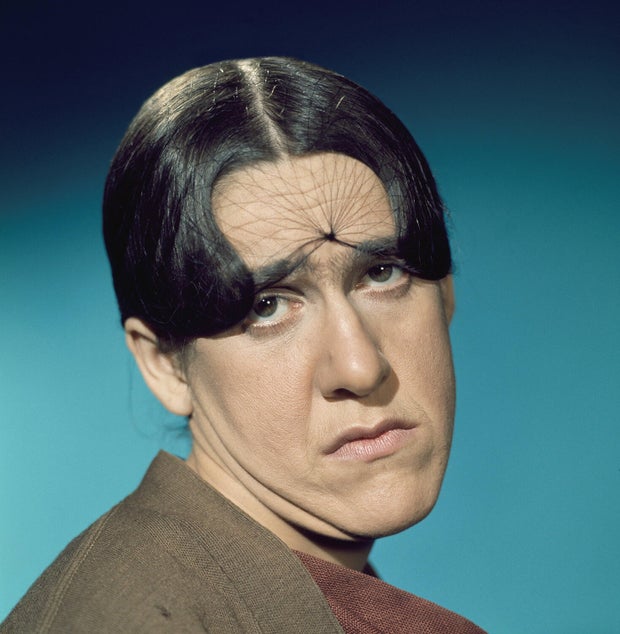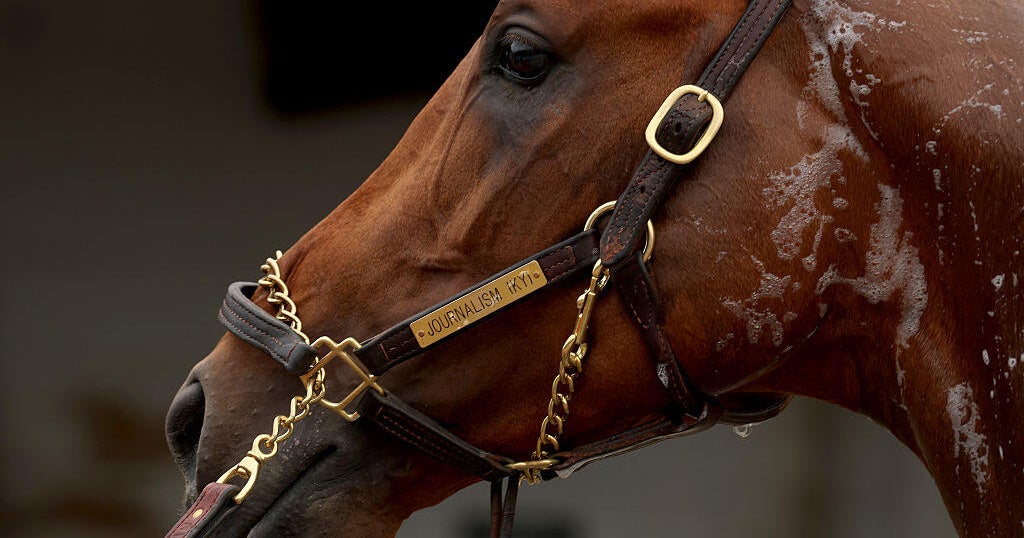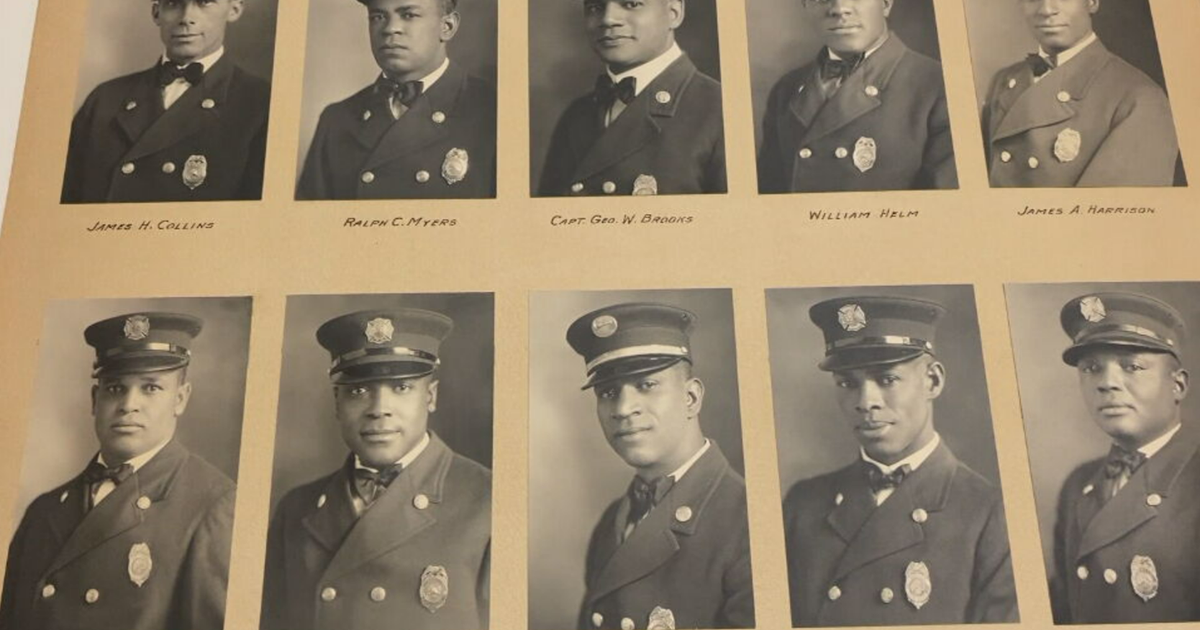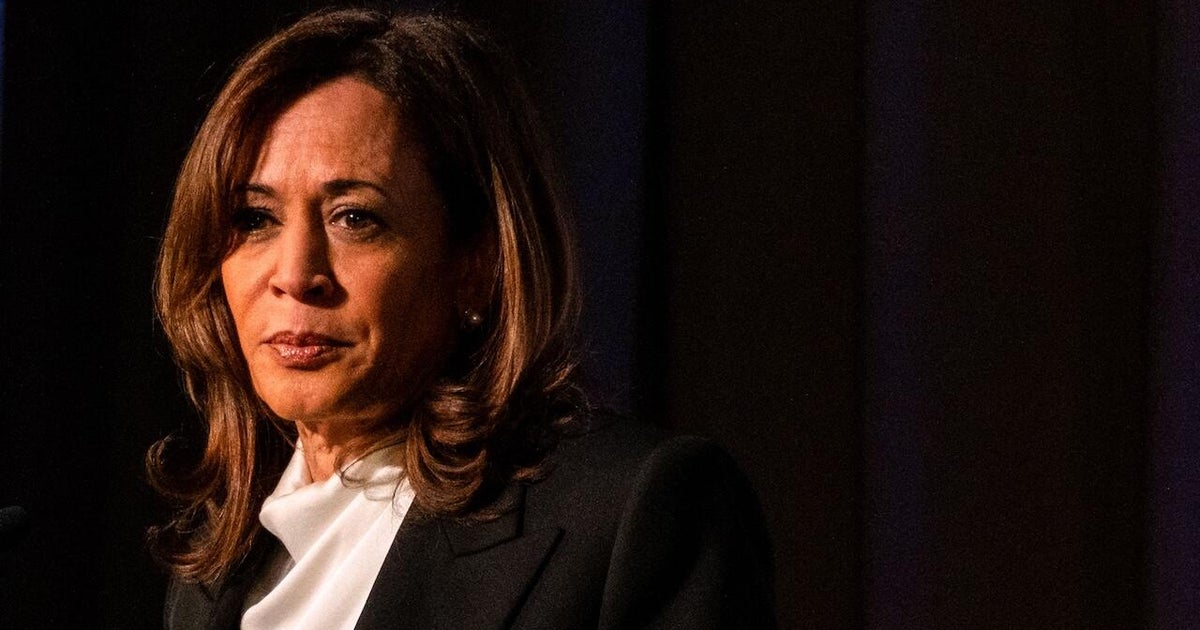 Jill Sobule performing at the Bowery Ballroom, March 16, 2000, in New York City. | Hiroyuki Ito/Getty Images
Jill Sobule performing at the Bowery Ballroom, March 16, 2000, in New York City. | Hiroyuki Ito/Getty Images
A look back at the esteemed personalities who left us this year, who'd touched us with their innovation, creativity and humanity.
By CBSNews.com senior producer David Morgan. The Associated Press contributed to this gallery.
During her more than three decades of recording, singer-songwriter-guitarist Jill Sobule (Jan. 16, 1959-May 1, 2025) released more than a dozen albums, EPs and compilations that addressed such complex subject matter as the death penalty, anorexia, the French Resistance, teen mental health, religion, and LGBTQ+ issues. Her 1995 song "I Kissed A Girl" was the first openly-gay-themed song to make it into the Billboard Top 20 despite being banned by many Southern radio stations.
Other hits included "Too Cool to Fall in Love," "Supermodel" (from the movie "Clueless"), and "Bitter."
Born in Denver, Sobule was praised for her witty and poignant writing, which first attracted attention with her 1990 album, "Things Here Are Different." After two record companies dropped her and two indie labels she was tied to went bankrupt, Sobule turned to crowdfunding, with a website, jillsnextrecord.com, to raise $75,000. "I think I got it within six weeks," Sobule told "CBS Evening News." In addition to small dollar gifts, one donor wrote in saying, "'I'm really not a fan of your music, but I think this is a great new model, so I'm giving you $50.'" The resulting album, "California Years," was released in 2009. She turned to crowdsourcing again for the 2018 album "Nostalgia Kills."
Sobule performed with such artists as Neil Young, Melissa Etheridge, Billy Bragg, Warren Zevon and Cyndi Lauper; appeared with "SNL" comedian Julia Sweeney in a stage show, "Jill and Julia"; and played herself performing a song on "The Simpsons." She also starred in "F*CK7thGrade," a 2022 autobiographical off-Broadway show described as "a queer musical memoir" that was nominated for a Drama Desk Award.
Last month, in an interview with Cincy Music, Sobule was asked about the changes she has seen in the recording business during her career. "The demise of the music industry as we once knew it, hasn't been great," she said. "Thinking of the sad-ass checks from Spotify. But it has also made one become creative in other endeavors. For example, musical theater. I do tell my theater pals that I have moved on from the music industry, as I've been told off-Broadway theater is so lucrative. They just laugh."
Ruth Buzzi Ruth Buzzi as her character Gladys Ormphby from the comedy series "Rowan & Martin's Laugh-In" (1968-1973). | NBC via Getty Images
Ruth Buzzi as her character Gladys Ormphby from the comedy series "Rowan & Martin's Laugh-In" (1968-1973). | NBC via Getty Images
Comedian Ruth Buzzi (July 24, 1936-May 1, 2025) rose to fame on NBC's "Rowan & Martin's Laugh-In" playing frumpy Gladys Ormphby, a hair-net-wearing spinster wielding her purse against the advances of a dirty old man (or, indeed, anyone).
Buzzi, who appeared on "The Garry Moore Show" and had guest spots on "The Monkees" and "That Girl," had played several characters on "The Steve Allen Comedy Hour," when she was noticed by "Laugh-In" creator-producer George Schlatter. In his memoir, "Still Laughing: A Life in Comedy," Schlatter wrote, "I must admit that the hairnet and the rolled-down stockings did light my fire. My favorite Gladys line was when she announced that the day of the office Christmas party, they sent her home early."
She threw herself into several characters on the sketch comedy show, from drunken barflies to Hollywood gossip columnist Busy Buzzi and Alice Capone (a takeoff on Marlon Brando's Vito Corleone). But Gladys Ormphby was the one with the most mileage. She brought her Ormphby character (and her purse) to the "Dean Martin Celebrity Roasts," "Sesame Street," a Weird Al Yankovic music video, and a Canada Dry ginger ale ad.
"Gladys embodies the overlooked, the downtrodden, the taken for granted, the struggler," Buzzi told The Connecticut Post in 2018. "So when she fights back, she speaks for everyone who's been marginalized, reduced to a sex object or otherwise abused. And that's almost everyone at some time or other."
Buzzi won a Golden Globe, and earned two Emmy nominations for "Laugh-In."
She was also in the original Broadway cast of "Sweet Charity" with Gwen Verdon in 1966, and had numerous TV and movie credits over the years, with appearances in "Love, American Style," "Medical Center," "You Can't Do That on Television," "Alice," "Freaky Friday," "The Jamie Foxx Show," "Sabrina the Teenage Witch," and more.
The hairnet and costume of Gladys was, Buzzi said, headed to the Smithsonian, but the character was never far away. "So many people ask me to hit them with my purse," she told the Jamestown, N.Y. Post-Journal in 2017. "In fact, a few years ago we were at a Beverly Hills party and in walked Elton John. He immediately made his way over to me and said, 'For God's sakes, Ruth, please hit me with your purse. That's been on my bucket list for years!'"
Pope Francis Pope Francis has a selfie taken while attending a meeting with the Italian Catholic Movement of Adult Scouts at the Paul VI Hall, Vatican City, November 8, 2014 | Grzegorz Galazka\Mondadori via Getty Images
Pope Francis has a selfie taken while attending a meeting with the Italian Catholic Movement of Adult Scouts at the Paul VI Hall, Vatican City, November 8, 2014 | Grzegorz Galazka\Mondadori via Getty Images
In 2013, when the aging Pope Benedict XVI, the conservative leader of the Catholic Church, resigned, the choice of a successor was nothing short of an election on the future direction of the Vatican. From the instant the progressive Argentinian cleric Jorge Mario Bergoglio walked out on the balcony overlooking St. Peter's Square, the papacy of Pope Francis (Dec. 17, 1936-April 21, 2025) signaled and end to "business as usual." He began with his choice of taking the name of a saint who lived in poverty after hearing God call him to "rebuild my church, for it is in ruins."
And the new pope's pronouncements demonstrated a willingness to look beyond accepted Catholic orthodoxy. He frankly discussed topics that were controversial within the Church, including gay priests and the role of women in leadership. He also offered a more welcoming tone to the LGBTQ community, saying, "If someone is gay and he searches for the Lord and has good will, who am I to judge?"
He spoke out to address the danger of climate change, criticized the global financial system, and favored the opening of borders not just for refugees from conflict but also for economic migrants.
His charisma and humility earned him the label "the People's Pope," while his willingness to take as inspiration the life of the humble founder of the Franciscan order rejuvenated some Catholics, and attracted non-Catholics to the pope's mission. New York Cardinal Timothy Dolan described the "Francis effect" to "Sunday Morning" in 2017: "The number of people that will come up to me as I'm walking the streets of New York and say, 'Hey, we like this guy, Francis. I haven't been to church in a while, but I'm taking a second look, okay?'"
The 266th pope was the first from the Americas. Born in Buenos Aires, the son of an accountant from Italy and the daughter of Italian immigrants, Bergoglio was ordained a priest with the Jesuit order, which he led during the country's violent dictatorship. He was named auxiliary bishop of Buenos Aires in 1992, and in 1998 became archbishop. Three years later, he was elevated to cardinal by Pope John Paul II.
His writings focused on social justice issues that would become among his chief concerns as pope: the poor, Indigenous peoples, the environment, and the need for a missionary church.
His first trip outside Rome as pope was to the island of Lampedusa in the Mediterranean, where he met with newly-arrived migrants. There, he denounced the "globalization of indifference" shown to refugees, many of whom had drowned while seeking a better life. In his homily during an open Mass there, Francis said, "Who has wept for the deaths of these brothers and sisters? Who has wept for the people who were on the boat? For the young mothers carrying their babies? For these men who wanted something to support their families? We are a society that has forgotten the experience of weeping, of 'suffering with'; the globalization of indifference has taken from us the ability to weep! … Let us ask the Lord for the grace to weep over our indifference, to weep over the cruelty in the world, in ourselves, and even in those who anonymously make socio-economic decisions that open the way to tragedies like this."
And despite his overall popularity, Francis did have his critics who believe he had blurred the lines around traditional Church teachings. For example, while stating that marriage was between a man and a woman, he also said that priests could bless same-sex couples.
"You bet there are some conservatives that are unhappy with Pope Francis," Cardinal Dolan told "Sunday Morning." "There're also some liberals that wish he would move much more radically and expeditiously in some of the reforms. So, you're gonna get it from both sides."
In 2017, when "Sunday Morning" correspondent Mo Rocca asked the pope why he chose the name Francis, the pontiff replied, "It just came to me."
He then left with a request of his audience: "Pray for me; I need it."
Jean Marsh Jean Marsh as Rose Buck in the ITV series, "Upstairs, Downstairs." | Universal Images Group via Getty Images
Jean Marsh as Rose Buck in the ITV series, "Upstairs, Downstairs." | Universal Images Group via Getty Images
Actress Jean Marsh (July 1, 1934-April 13, 2025) won an Emmy for her performance as Rose Buck, a Cockney parlor maid, in the British TV series "Upstairs, Downstairs," a show she co-created.
It was during a vacation in the south of France when she and actress Eileen Atkins (both of whom had been raised in working-class environments) came up with the storyline of "Upstairs, Downstairs." Set in Edwardian London, it traced the lives of the well-to-do Bellamy family and the servants in their Belgravia townhouse. The show ran from 1971-75 and was an international hit, earning Marsh three Emmy nominations and a win.
A BBC sequel, begun in 2010 and starring Claire Foy, featured Marsh (the only actor to appear in both series) as Rose, this time promoted to housekeeper. She earned a fourth Emmy nomination, but her participation was limited in the second season, having suffered a minor stroke. Marsh and Atkins also created a 1990s BBC series, "The House of Eliott."
Asked once about royalties she may have earned from creating and starring in "Upstairs, Downstairs," Marsh noted the differences between Hollywood and British TV: "If it had happened in America, I'd be Mary Tyler Moore. As it is, I'm Mary Tyler Less," she told UPI in 1982.
Born in London, Marsh attended dancing school and the Aida Foster Theatre School. She made her West End debut at age 12, and appeared in repertory productions before traveling to Broadway in 1959, to star as Hero in "Much Ado About Nothing" opposite John Gielgud. She also starred with Laurence Olivier in a TV production of "The Moon and Sixpence."
Marsh's other TV roles included a 1959 "Twilight Zone" episode, "The Lonely," in which she played an android, gifted to a condemned man confined to a solitary life on an asteroid. She starred as Sara Kingdom, an assistant of "Doctor Who" during the BBC series' third season. She appeared in "Danger Man," "I Spy," "The Saint," "Jane Eyre" (as Rochester's wife), "UFO," "The Waltons," "Hawaii Five-O," "Nine to Five," "Murder, She Wrote," "Fatherland," and "Sense & Sensibility."
In films she appeared in "Cleopatra" as the wife of Marc Antony; "Charlie Bubbles," with Albert Finney; Alfred Hitchcock's "Frenzy"; "The Eagle Has Landed"; "The Changeling"; "Return to Oz"; "Willow"; and "Danny the Champion of the World."
She returned to Broadway in the '70s in Alan Bennett's "Habeas Corpus," and "Whose Life Is It Anyway?" opposite Tom Conti.
She also wrote fiction, including novels based on "The House of Eliott." Marsh described her writing process to This Is Bristol in 2011: "When I write, I am never really sure where the story is going. The only way I can describe the process is that my characters sometimes do things without my permission. When I was writing 'Fiennders Abbey,' one of them died without my permission, and I remember being quite upset. I had to take a break and have a glass of wine."
Jay North Jay North as the title character of the sitcom "Dennis the Menace," which debuted on CBS in 1959. | CBS via Getty Images
Jay North as the title character of the sitcom "Dennis the Menace," which debuted on CBS in 1959. | CBS via Getty Images
"Hey, Mr. Wilson!" Jay North (Aug. 3, 1951-April 6, 2025), who began appearing on kids' TV shows when he was 5, had already played small roles on "77 Sunset Strip" and "Wanted: Dead or Alive" when he was cast, at age 6, as the bright-eyed troublemaker in the TV adaptation of Hank Ketcham's comic strip "Dennis the Menace." The series ran on CBS for four years beginning in 1959, but Dennis continued to strike terror in the heart of his elderly neighbor, George Wilson, for years after in syndication.
The stardom came at a cost to the child. He told the Los Angeles Daily News in 1993 that he had been abused by his aunt and uncle, who would be with him on set while North's single mom was at work. "If it took me more than one or two takes, I would be threatened and then whacked," North said.
His other TV and film credits in the 1960s and early '70s included "Wagon Train," "The Man From U.N.C.L.E.," "Maya," and voice work for "The Banana Splits Adventure Hour" and "The Pebbles and Bamm-Bamm Show."
After appearing on stage in "Butterflies Are Free," North had a brief stint in the Navy in the 1970s, and tried to return to show business with more mature, darker roles. Aside from a 1985 Yugoslavian World War II film, "Wild Wind," North's appearances were mostly playing off his child actor past. He satirized his Dennis the Menace role on HBO's "Not Necessarily the News," and played himself in a 1999 episode of "The Simpsons" and the David Spade comedy "Dickie Roberts: Former Child Star."
He also helped counsel other child and former child actors through the nonprofit organization A Minor Consideration.
Val Kilmer A 1994 portrait of actor Val Kilmer, in Santa Fe, New Mexico. | Donaldson Collection/Getty Images
A 1994 portrait of actor Val Kilmer, in Santa Fe, New Mexico. | Donaldson Collection/Getty Images
The smoldering intensity of actor Val Kilmer (Dec. 31, 1959-April 1, 2025) radiated off movie screens with his memorable turns as brooding artists, obsessive criminals, doomed lawmen, and a fighter jock nicknamed Iceman. He starred in such films as "Top Gun," "Heat," "Tombstone" and "The Doors."
While attending New York City's Juilliard School (he was admitted at age 17), Kilmer co-wrote and appeared in the play "How It All Began." In 1983 he starred on Broadway in the play "Slab Boys," opposite Kevin Bacon and Sean Penn. He made his movie debut in the 1984 spoof "Top Secret!" (from the creators of "Airplane!"), followed by "Real Genius."
One of his most memorable characters, that of pilot Tom Kazansky in 1986's "Top Gun," almost didn't happen. Kilmer wrote in his 2020 memoir, "I'm Your Huckleberry," that he initially turned down the role: "I didn't want the part. I didn't care about the film. The story didn't interest me." Script changes led to his signing up.
As a charismatic leading man, Kilmer commanded the screen playing Doc Holliday in the western "Tombstone," a demolition expert in the bank heist film "Heat," and rock idol Jim Morrison in "The Doors." Other films included "Willow," "Thunderheart," "True Romance," "The Ghost and the Darkness," "The Saint," "Alexander," "Kiss Kiss Bang Bang," "Déjà Vu," "Bad Lieutenant: Port of Call New Orleans," "Joe the King," "Spartan," "Twixt," and "Wonderland."
Kilmer wrote, directed and starred in a one-man stage show in which he played humorist Mark Twain, titled "Citizen Twain." He also published two books of poetry. Following treatments for cancer, Kilmer repeated the role of Iceman in the 2022 sequel, "Top Gun: Maverick."
A low point may have been when he donned the Batman costume to star in the 1995 film "Batman Forever." He explained in the documentary "Val" that the suit constricted his performance: "It was frustrating until I realized that my role in the film was just to show up and stand where I was told to."
Kilmer's reputation for being difficult on set would dog him (John Frankenheimer, who replaced the fired director of "The Island of Dr. Moreau," told Entertainment Weekly that there were two things he would never do: "Climb Mount Everest, and work with Val Kilmer again"). But he was also praised by fellow actors for his immersion into his characters.
In a tribute to Kilmer, actress Jennifer Tilly recalled the audition process for Oliver Stone's "The Doors": "It was kind of a cattle call. They paired together potential Jims with potential Pamelas. And they were running behind so we were spilling out of the casting office, sitting on the porch, the lawn, and the driveway. All of a sudden, a sixties convertible came screeching up, blaring Doors Music at top volume. And a guy jumped out and strode inside: He had wild hair and he was barefoot, shirtless, and wearing nothing but a pair of tight leather pants. We all looked at each other like… Who is this guy? We were more than a little shook by the sheer audacity of his entrance. Well of course it was Val Kilmer and from that minute on, nobody else stood a chance."
Richard Chamberlain Richard Chamberlain in the 1983 TV miniseries "The Thorn Birds." | ABC Photo Archives via Getty Images
Richard Chamberlain in the 1983 TV miniseries "The Thorn Birds." | ABC Photo Archives via Getty Images
Actor Richard Chamberlain (March 31, 1934-March 29, 2025) became a star and teen heartthrob playing the title character of the 1960s television series "Dr. Kildare," and later became known as "king of the miniseries" for his starring roles in such hits as "Shogun" and "The Thorn Birds," for which he won two Golden Globes.
Born in Beverly Hills, Chamberlain originally studied to be a painter. But after serving in the Army during the Korean War, he decided to pursue acting. Small roles in "Alfred Hitchcock Presents," "Gunsmoke," "Mr. Lucky," and the 1960 film "The Secret of the Purple Reef," lead to his role as Dr. James Kildare.
The show, which ran for five seasons, featured Chamberlain as the handsome and caring attendant to a panoply of guest-star patients seeking aid and comfort for a variety of afflictions. While the show inspired numerous medical series to follow, its star received 12,000 pieces of fan mail a week, in addition to requests for medical advice. "I didn't entirely buy the fact that I was thought enchanting by a lot of people," he told The Associated Press in 2014. "But I enjoyed it tremendously, even as a part of me went, 'Realllly?!'"
His roles in "Dr. Kildare" and the romantic drama "Joy in the Morning" led to his being named Photoplay magazine's most popular male star in 1963-65.
After the series was cancelled, Chamberlain moved to England, where he starred in "Petulia" opposite Julie Christie, and the BBC adaptation of Henry James' "The Portrait of a Lady." He also played "Hamlet" on stage, a performance he repeated in a 1970 TV adaptation. Other films and TV movies included "Julius Caesar" with Charlton Heston, "The Madwoman of Chaillot" with Katharine Hepburn, Ken Russell's "The Music Lovers," "The Towering Inferno," "The Three Musketeers" and its sequels, "The Count of Monte-Cristo," "The Man in the Iron Mask," and "The Last Wave."
In 1978 he landed the starring role in "Centennial," a 26-hour miniseries based on James Michener's novel. He followed that in 1980 with "Shogun" (another epic miniseries based on James Clavell's novel about an American visitor to feudal Japan), and 1983's "The Thorn Birds," based on Colleen McCullough's romantic bestseller. Chamberlain played Father Ralph de Bricassart, a Roman Catholic priest who falls in love with Rachel Ward's Meggie Cleary. The ABC production, also starring Barbara Stanwyck, attracted a reported 100 million viewers. He reprised his role of de Bricassart in a 1996 TV movie, "The Thorn Birds: The Missing Years."
Other film and TV credits included "King Solomon's Mines," "Wallenberg: A Hero's Story," "The Bourne Identity," "Touched by an Angel," "Desperate Housewives," "The Drew Carey Show," "Will & Grace," and the 2017 revival of "Twin Peaks."
Having starred in the film musical "The Slipper and the Rose," Chamberlain appeared on stage as Henry Higgins in a 1994 Broadway revival of "My Fair Lady," and as Captain von Trapp in a 1999 revival of "The Sound of Music."
It was decades into his career, in 2003, that Chamberlain revealed, in his autobiography "Shattered Love," that he was gay.
In his memoir, Chamberlain wrote of how he was forced to hide his sexuality by escorting actresses to movie premieres and other public events. No longer playing "a cat-and-mouse game" with the press, he could now be open. "I was one tough interview," he told The New York Times in 2003. But now, ''I have no image to defend."
Having experienced a troubled childhood, an alcoholic father, and a lingering "sense that there was something wrong with me," Chamberlain told The AP in 2014 that he was at a happy stage in his life because he had accepted himself. "I think love is the source of wisdom, of strength, of intelligence," he said. "It's a presence that exists within us and without us. I think it's all of that. It's not a box of chocolates."
George Foreman Boxer George Foreman strikes a pose in 1976. | Bettmann Archive/Getty Images
Boxer George Foreman strikes a pose in 1976. | Bettmann Archive/Getty Images
Boxer George Foreman (Jan. 10, 1949-March 21, 2025) rose up from poverty in a tough Houston neighborhood to become an Olympic gold medalist at 19, and heavyweight champion of the world twice. An uncommon man with the common touch, he also conquered success outside the ring as an advertising pitchman and star of infomercials.
In 1973, at age 24, Foreman defeated Joe Frazier to become world champion. The following year, he defended his heavyweight title against Muhammad Ali in Kinshasa, Zaire, in one of the most touted boxing matches of all time, "The Rumble in the Jungle." "I beat him up for the first three rounds, four rounds. I think I even beat him up the sixth round, too," Foreman told "Sunday Morning" in 2005. "Then all of a sudden I hit him in the seventh round and he whispered in my ear, `That all you got, George?' Oh, that was all I had. You've heard of the rope-a-dope? Well, here's the dope!" Ali, then the underdog, won in the eighth round by a knockout; Foreman lost the title.
At the time, he was devastated. "I was young, only 25 years old. I didn't know what to do. I thought my life was over, because when you lose the championship it's not like you lost the title, you lose yourself, because it's like you're not a man anymore."
Three years later, after another loss, Foreman had a religious experience that changed his life. He quit boxing and became an evangelist, preaching first on street corners, then in his own church. He opened the George Foreman Youth and Community Center, a safe place for kids to hang out. "For 10 years, I didn't even make a fist," he said. "I didn't box, I didn't try to box, I was done with it. I was a preacher, a happy, fat preacher."
But money problems drove him back to the ring. So, at 37, Foreman began his comeback. He was ridiculed at first — too old, too fat, too slow, they said — but he was also too strong, and in 1994, more than 20 years after he beat Frazier for the title, Foreman knocked out the undefeated Michael Moorer. At age 45, Foreman became the oldest heavyweight champion ever.
That same year, Foreman agreed to help market a kitchen grill that few were buying, in exchange for a piece of the company. In the first 15 years, Foreman said they sold 100 million of the George Foreman Lean Mean Fat Reducing Grilling Machines and its variations.
"When you go through the airport some time and people stop and say 'George, we love the grill!' that's greater than them telling me, 'George, you did a good job becoming the heavyweight champ of the world!'" Foreman said.
And he continued selling, not just grilling machines but also mufflers, chips, hot dogs, video games, home warranties, and a George Foreman clothing line.
"I'm driven," he said in 2005. "I like the life I'm living, but I'm driven because there's so much more to obtain. I'm one of those guys who's going to have to fall out of the saddle. There's always one more star to reach for and I'm trying to."
Married five times, Foreman had 12 children. And yes, he did name all five of his sons George. "You got Muhammad Ali, Joe Frazier, Kenny Norton, Ron Lyle, you let those people hit you on the head and see how many names you're going to remember — it would be confusing," he told "Sunday Morning." "I kept it simple. I never forget a name!"
It also inspired a children's book he wrote, titled, "Let George Do It!"
Alan Simpson Senator Alan Simpson (R-Wyo.), at the National Press Club in Washington, March 8, 1996. | DENNIS COOK/AP Photo
Senator Alan Simpson (R-Wyo.), at the National Press Club in Washington, March 8, 1996. | DENNIS COOK/AP Photo
A political moderate, Republican Senator Alan Simpson (Sept. 2, 1931-March 14, 2025) served three terms representing Wyoming, from 1979 to 1997, and played a key role in rallying GOP support around the party's legislative agenda.
At 6-foot-7 (he was the tallest Senator up to that time) with a quick wit, Simpson was able to bridge partisan impasses, and foster relationships across the aisle at a time of increasing political acrimony. "The word 'politics' is interesting," he told "Sunday Morning" in 2018, "because it comes from the Greek, you know that? Poly, meaning many, and tics, meaning blood-sucking insects!"
Simpson maintained his own views even when they crossed Republican orthodoxy. A deficit hawk, Simpson also supported abortion rights. He served on the Immigration Subcommittee and the Veterans Affairs Committee, among others.
After leaving the Senate, Simpson taught about politics and the media at Harvard University and the University of Wyoming. In speeches he urged college students to become politically involved.
In 2022, President Joe Biden awarded Simpson the Presidential Medal of Freedom.
One of Simpson's closest friends was a Democrat, Norman Mineta, a Congressman from California who also served as Commerce Secretary under President Bill Clinton and as Transportation Secretary under President George W. Bush.
The two had met as Boy Scouts when Mineta and his family were imprisoned as Japanese-Americans in the Heart Mountain War Relocation Center near Simpson's hometown of Cody, Wyo., during World War II. Simpson and Menieta bonded over playing pranks on the other Scouts, including a bully whose tent they sabotaged: "It was raining to beat hell and we kinda channeled the water down into this guy's tent," Simpson told "Sunday Morning."
The two friends would not see each other until decades later, when Mineta (who had become Mayor of San Jose, Calif.), won election to Congress. "And there we were, and we started right over just like that," Simpson said.
Mineta said, "We'd have fights in the sub-committee, the full committee, and yet we'd slap each other on the back and say, 'Come on, let's go have dinner, let's go have a drink.' And they don't do that [today]. They just don't have that kind of personal relationship."
In 1988 Simpson and Mineta joined forces to help pass the Civil Liberties Act, signed by President Ronald Reagan, which for the very first time formally apologized to Japanese-Americans, and granted reparations to those who had been imprisoned.
Joseph Wambaugh Author Joseph Wambaugh attends the 13th annual Los Angeles Times Festival of Books, April 26, 2008. | David Livingston/Getty Images
Author Joseph Wambaugh attends the 13th annual Los Angeles Times Festival of Books, April 26, 2008. | David Livingston/Getty Images
Bestselling author Joseph Wambaugh (Jan. 22, 1937-Feb. 28, 2025), a former Los Angeles police officer, wrote 11 novels about crime and policing as well as non-fiction works, several of which were adapted for films and television, including "The New Centurions," "The Blue Knight," and "The Choirboys," as well as the true-crime stories "The Onion Field" and "Echoes in the Darkness." He was also the co-creator of the anthology series "Police Story," which debuted on NBC in 1973.
Other novels included "The Black Marble," "The Glitter Dome," "The Delta Star" and "The Secrets of Harry Bright." He was the winner of three Edgar Awards.
The son of a police officer, Wambaugh (a Marine veteran who originally intended to become an English teacher) drew on his own experiences as an L.A. police officer for his writing, as well as stories heard from other veterans of the force. He was a detective sergeant when his first novel, "The New Centurions," was published in 1971.
By the time "The Onion Field" was published, his celebrity had become so great it interfered with his police work. He quit the LAPD after 14 years on the job and began writing full-time.
In a 1997 symposium at the University of California, Wambaugh said, "Police procedurals generally tell how a cop acts on the job, and I was more interested in how the job acts on the cop, and the cop's head. So, from the very beginning that was my interest. That's what I wrote about, and that's what made my stuff different, because some of my stories, police stories, have virtually no action whatsoever. No gunplay. Nothing much happening, except what's happening inside the head of the man or woman doing the job."
David Johansen Singer David Johansen, as his alter ego Buster Poindexter, in a 1989 portrait. | Al Pereira/Getty Images
Singer David Johansen, as his alter ego Buster Poindexter, in a 1989 portrait. | Al Pereira/Getty Images
Musician and vocalist David Johansen (Jan. 9, 1950-Feb. 28, 2025) was known both for his role in the glam-protopunk band the New York Dolls, and for his stage persona as an over-the-top pompadour-styled lounge singer who performed swing and blues-infused pop under the name Buster Poindexter.
While the New York Dolls didn't achieve mainstream success (internal strife and addictions tore at the founding members, who produced two albums before breaking up), it influenced other groups in the '70s, including the Ramones, the Sex Pistols, Kiss and Guns N' Roses. In 2004 Johansen reconstituted the Dolls with new players (four of its members had died by then) for England's Meltdown Festival, which led to three more albums.
In the 1980s, Johansen, as Buster Poindexter, had a hit with "Hot, Hot, Hot," and a cover of "Hit the Road, Jack." By 2000, he was back to recording under his own name, with the albums "David Johansen and the Harry Smiths" and "Shaker."
He also acted in the films "Candy Mountain," "Let It Ride," "Freejack," "Married to the Mob," the Bill Murray comedy "Scrooged" (as the Ghost of Christmas Past), and the TV series "Oz," and hosted a weekly show on Sirius Satellite Radio.
In a 2014 profile for Interview Magazine, Johansen said he began the Buster Poindexter character while performing a series of cabaret shows at Tramps, a Lower East Side bar. "I used that moniker because I didn't want people to be coming in and yelling for songs that I was famous for; I could just do what I wanted," he said. Then, "without any publicity or anything, it became very popular, so I started doing weekends there. It wasn't a plan or anything, it just happened."
He was insouciant about reactions to the lounge music he performed as Buster: "Well, like a lot of stuff I do, 10 years later it becomes popular," he told Interview.
Boris Spassky Chess grandmaster Boris Spassky plays 41 competitors simultaneously at a tournament in New York City in 1974. | Bettmann Archive/Getty Images
Chess grandmaster Boris Spassky plays 41 competitors simultaneously at a tournament in New York City in 1974. | Bettmann Archive/Getty Images
In 1972, Soviet-era world chess grandmaster Boris Spassky (Jan. 30, 1937-Feb. 27, 2025) lost his world championship title to American Bobby Fischer in a televised tournament in Reykjavik, Iceland, that became an international sensation during the Cold War.
Then 29 years old, Fischer, a chess genius from Brooklyn, lost and forfeited the first two games, then beat Spassky in the third. Fischer would overcome Spassky in the 21-game tournament, becoming the first American to attain the world chess title, after the Soviet Union had dominated the game for decades. [Fischer would later forfeit the title by refusing to defend it.]
In a 2016 interview with Sport-Express newspaper, Spassky said that when he played his third match against Fischer, he was pressured by the chairman of the Sports Committee to stop the tournament early: "He instructed me what to do: 'File a protest against this, against that, then just fly away ...' But I resisted – I wanted to play! What a fool I was."
In 1974, in New York City, Spassky simultaneously played 41 competitors, ranging from chess experts to novices (including a six-year-old). Beginning each game with the move Pawn-to-King 4, Spassky won 40 matches and drew one.
He emigrated to France in 1976, but in 2012 he returned to Moscow.
In his 2016 interview, Spassky said his years in the late 1960s and early '70s as world champion were his unhappiest, because of the responsibility he held from winning: "You can't imagine how relieved I was when Fischer took the title off me," he said. "Honestly, I don't recall that day as unhappy. On the contrary, I've thrown off a very strong burden and breathed freely."
Gene Hackman Gene Hackman as wiretap expert Harry Caul in Francis Ford Coppola's "The Conversation." | Silver Screen Collection/Getty Images
Gene Hackman as wiretap expert Harry Caul in Francis Ford Coppola's "The Conversation." | Silver Screen Collection/Getty Images
Two-time Oscar-winner Gene Hackman (Sept. 1, 2023-death announced Feb. 27, 2025) was a consummate actor renowned for playing complicated figures in such classics as "The French Connection," "The Conversation" and "Unforgiven," and who also delighted superhero fans as the comical villain Lex Luthor in three "Superman" films.
Hailed as one of the best actors of the era, Hackman moved easily among genres, from heart-wrenching family stories ("I Never Sang for My Father"), crime dramas ("Bonnie and Clyde," "Mississippi Burning"), thrillers ("The Conversation," "No Way Out"), and triumphant tales of sports ("Hoosiers"), to comedies ("Get Shorty," "The Royal Tenenbaums"). Rough-hewn and flinty, a movie star without stereotypical movie-star looks, Hackman gave even his humorous roles a sinister, unforeseeable edge, the way an animal's behavior is not entirely predictable.
"The French Connection" would cement Hackman's position as a movie star. The film's brash, documentary-style production perfectly captured Hackman's character, a seething, sadistic NYC cop seeking to bust a ring of heroin smugglers — like Ahab on the hunt for the white whale. He won his first Academy Award, and his star power led him to both big-budget studio fare (headlining an all-star cast in the 1972 disaster film "The Poseidon Adventure"), and small character dramas (such as "Scarecrow," opposite Al Pacino).
In 1992, the year he appeared in Clint Eastwood's revised western "Unforgiven" (as the brutal sheriff "Little" Bill Daggett), he also starred on Broadway in "Death and the Maiden" with Glenn Close and Richard Dreyfuss, under the direction of Mike Nichols.
Hackman was less "method-y" than some of his peers, though he admitted that the ways in which he would behave on-screen and off as he inhabited a character — fueled by memories of his dysfunctional family growing up and the slights he faced during his struggling early years – took their toll. Temper tantrums earned him a nickname: "Vesuvius."
When he met up with Daniel Lenihan for some scuba lessons, the two got to talking about adventure books they grew up with, and decided to try writing one — a pirate story. Picking different starting points, Hackman wrote his chapters longhand in spiral notebooks; the two would then meet up at a café to go over their work. "I would have some pages, he would have some pages," Hackman told "Sunday Morning" in 2000. "We would trade. And we'd read them over while we were ordering and eating, and by the end of that couple of hours, we would have critiqued each other's work, and decided where we were going to go from there."
"The Wake of the Perdido Star," a tale of shipwrecks and piracy set in 1805, was published in 1999. It sold well, but received mixed reviews. He told "Sunday Morning," "The fact that you're being judged on your intelligence and your skill as a writer, and your skill as a storyteller, that was very tense for me — and being criticized, and finding that you're vulnerable to the critics, in a way that I hadn't experienced before."
He retired from the screen in 2004, and would only return as narrator on a pair of documentaries about the Marines. He turned down most interview requests, but in 2021, to mark the 50th anniversary of "The French Connection," he shared with the New York Post the revelation that he'd only watched the film once. "Filmmaking has always been risky — both physically and emotionally — but I do choose to consider that film a moment in a checkered career of hits and misses," he wrote in an email.
Michelle Trachtenberg







